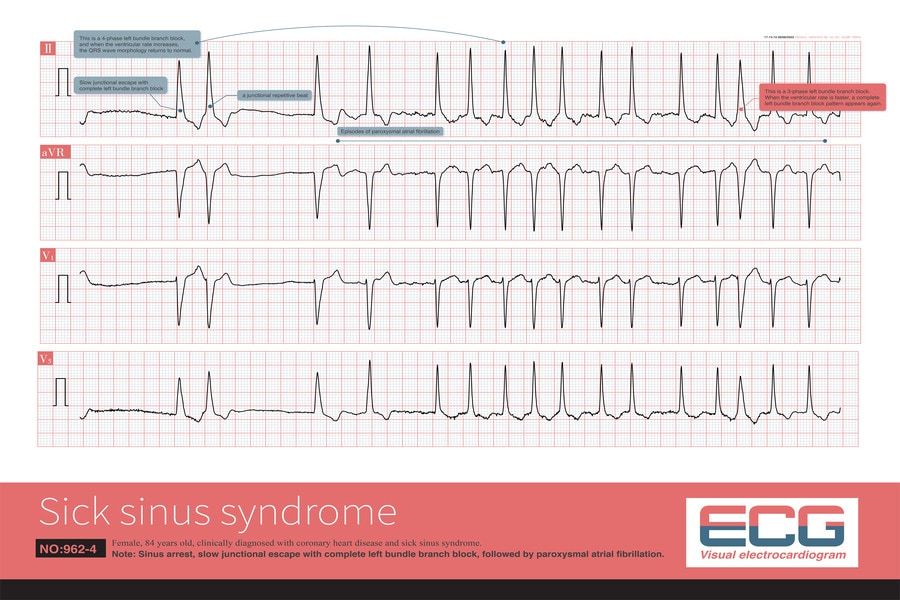Sick sinus syndrome, also known as sinus node dysfunction, is a group of heart rhythm disorders in which the heart’s natural pacemaker, the sinus node, doesn’t function properly. The sinus node is responsible for initiating the electrical impulses that regulate the heart’s rhythm and rate. When it malfunctions, the heart may beat too slowly (bradycardia), too quickly (tachycardia), or in an irregular pattern.
Overview:
Sick sinus syndrome is relatively uncommon but becomes more prevalent with age. It often occurs in people with existing heart disease or those who have had heart surgery. The condition can be challenging to diagnose, as symptoms may be intermittent and resemble other heart disorders. Treatment for sick sinus syndrome typically involves implanting a pacemaker to regulate the heart’s rhythm.
Symptoms:
The symptoms of sick sinus syndrome can vary widely and may include:
- Fatigue or weakness
- Dizziness or lightheadedness
- Fainting (syncope) or near-fainting episodes
- Shortness of breath
- Chest pain or discomfort
- Confusion or difficulty concentrating
- Palpitations or a sensation of a rapid, fluttering heartbeat
Causes:
The exact cause of sick sinus syndrome is not always known, but it is generally linked to age-related degeneration of the heart’s electrical system. Other potential causes or contributing factors may include:
- Underlying heart conditions such as coronary artery disease or previous heart attack
- High blood pressure
- Diabetes
- Thyroid disorders
- Certain medications, including beta-blockers, calcium channel blockers, and anti-arrhythmic
- Inflammatory conditions like rheumatic fever or Chagas disease
Risk Factors:
- Age: Sick sinus syndrome becomes more common as people get older, with most cases occurring in individuals over 60 years old.
- Existing heart disease: People with a history of heart disease are more likely to develop sick sinus syndrome.
- Medication use: Certain medications that affect the heart’s rhythm can increase the risk of sick sinus syndrome.
Prevention:
While you can’t always prevent sick sinus syndrome, you can take steps to reduce your risk of heart-related conditions:
- Eat a heart-healthy diet
- Exercise regularly
- Maintain a healthy weight
- Manage stress
- Avoid smoking
- Limit alcohol consumption
- Control underlying conditions such as high blood pressure, diabetes, or high cholesterol
When to See the Doctor:
If you experience symptoms like dizziness, shortness of breath, fainting, or irregular heartbeats, it’s essential to seek medical attention. Early diagnosis and treatment can help prevent complications and improve quality of life.
Treatment:
Treatment for sick sinus syndrome depends on the severity of the symptoms and the underlying cause. Options may include:
- Medication adjustments: Discontinuing or adjusting medications that affect heart rhythm may improve symptoms.
- Pacemaker implantation: A pacemaker is a small device implanted under the skin that sends electrical impulses to regulate the heart’s rhythm.
- Radiofrequency ablation: In some cases, destroying the tissue responsible for abnormal electrical signals may help restore a regular heart rhythm.
Additional Information:
Sick sinus syndrome can be a progressive condition, and symptoms may worsen over time. Regular follow-up with a healthcare provider is crucial for managing the disease effectively. Lifestyle modifications, such as adopting a heart-healthy diet and engaging in regular physical activity, can help improve overall heart health and may reduce the impact of sick sinus syndrome on daily life.
Sick sinus syndrome is a complex heart rhythm disorder that can significantly impact one’s quality of life. Early diagnosis and appropriate treatment are crucial for managing the condition and preventing complications. If you experience symptoms suggestive of sick sinus syndrome, consult a healthcare professional promptly.









